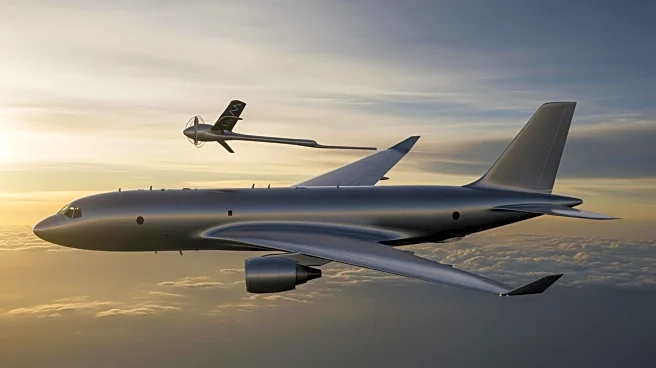What's Happening?
Airbus is considering doubling the production of its A330neo-based Multi-Role Tanker Transport (MRTT+) aircraft due to increased market demand. The company typically delivers about four MRTT aircraft annually,
but the current market outlook suggests a higher demand than previously anticipated. María Ángeles Martí, head of Airbus' tanker program, indicated that if market forecasts translate into contracts, production could be doubled. The Royal Thai Air Force has been secured as the launch customer for the MRTT+, transitioning from the A330-200 to the A330-800 platform. The first aircraft is expected to enter the conversion line in Madrid next year, with certification planned for 2028 and delivery in early 2029. Airbus has been successful in tanker competitions against Boeing and is in discussions with current and prospective customers, including Germany and Qatar.
Why It's Important?
The potential increase in production of Airbus MRTT+ tankers signifies a growing demand for military refueling aircraft, which could impact global defense strategies and procurement. Airbus' success in securing contracts over Boeing highlights competitive dynamics in the aerospace industry. The transition to the A330-800 platform and enhancements like automated refueling systems could set new standards in military aviation technology. Countries like Germany and Qatar considering the MRTT+ could influence regional defense capabilities and alliances. The development of advanced refueling technologies, such as nighttime automated refueling, could enhance operational efficiency and safety for air forces worldwide.
What's Next?
Airbus is working on further enhancements to the MRTT+, including automating the underwing drogue refueling system and improving camera systems for night vision compatibility. These advancements could lead to increased interest from military customers seeking cutting-edge refueling capabilities. The company is also exploring potential deals with countries currently using Airbus tankers and new buyers. As Airbus continues to refine its technology, it may face increased competition from other aerospace manufacturers, potentially leading to innovations in the sector.
Beyond the Headlines
The shift towards automated refueling systems and enhanced camera technology reflects broader trends in military aviation towards increased automation and safety. These developments could have long-term implications for how air forces conduct refueling operations, potentially reducing human error and increasing mission success rates. The MRTT+ program's success may also influence Airbus' strategic decisions in other areas of aerospace technology, fostering innovation and collaboration across the industry.











